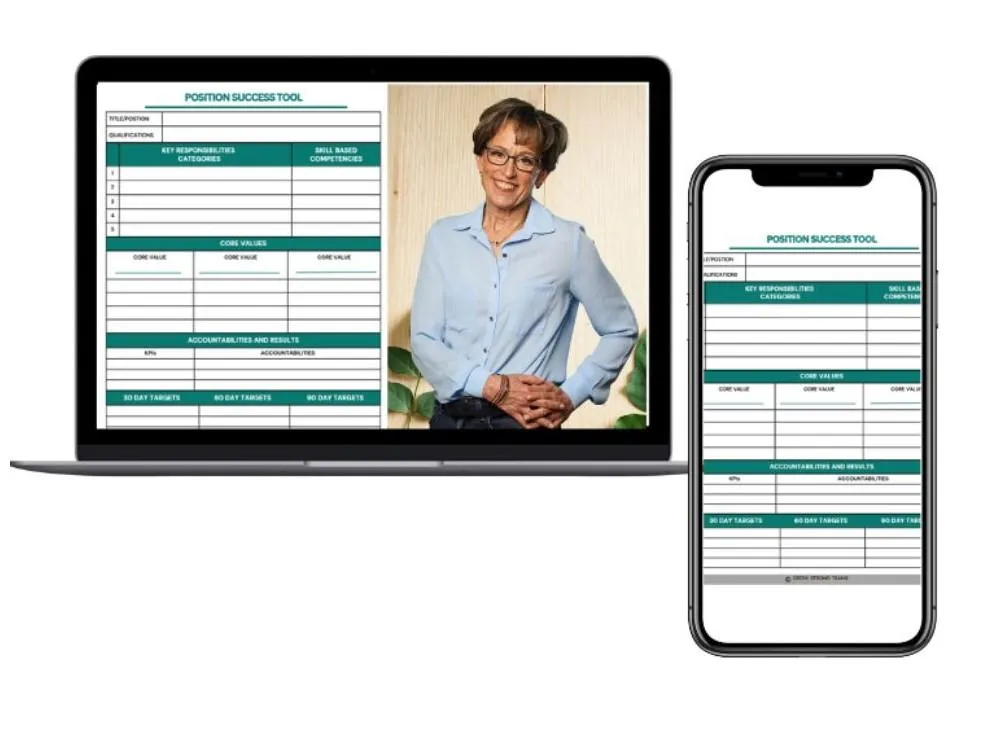Establish Your "Team Foundation": Shift from Micromanaged to Self-Managed in Simple Steps
Create Accountability and Desired Behaviours That Drive the Success of Your Business With My Innovative "Position Success Tool"

Break Free from the Micromanagement Trap
Empower Your Team for Growth and Excellence in Your Business
Are you an owner or manager of a health care, dental or medical business constantly caught in the cycle of micromanagement?
Do you find yourself overwhelmed by the need to oversee every detail, leaving you with no time to focus on creating a thriving team?
You're not alone.
The health, dental and medical service industry is notorious for its high-stress environments, leading many to believe that micromanagement is the only way to maintain control and provide exceptional care.
But what if there's a better way?
Recent studies reveal that excessive micromanagement can lead to high turnover rates, decreased employee morale, and ultimately effect the connection to value and outcomes in your business.
The key to breaking this cycle isn't more oversight—it's empowerment. Empowering your team can lead to increased accountability, connection to the core purpose, solid outcomes and a thriving workplace culture.
Navigating the Complexities of Healthcare Leadership
These 3 Common Misconceptions Will Never Solve Your Micromanagement Problems

Hiring the Right Employee
“I can solve this by hiring the right employee next time. They will take the load off, and then I can return to running the business.”
As we all know, finding the right fit is a challenge. These candidates exist, and are more difficult to find, but this won't solve your micromanagement challenge.

Better Pay or Benefits
“I just try to pay them more if possible, as well as offer benefits."
We all know money is a big external motivator, so you might think that increasing your offer – paying more or offering better benefits - is the answer, only to discover that you begin to micromanage again.

Improving Job Descriptions
"I don't understand why they aren't clear on the expectations of the position. They have a job description" Let's face it: most businesses have typical job descriptions for the position, but they don't seem to serve well to create clarity around accountability. "If the job description were better, this would help me delegate more and be less of a control freak."
The constant need to micromanage not only adds to your stress but also hinders your team's ability to grow and take initiative.
Traditional solutions like revising job descriptions or increasing salaries have proven to be short-term fixes. They don't address the root cause of the problem: a lack of clear expectations that support growth, development and accountability by empowering your team.
Introducing a Revolutionary Approach to Team Management
Empower Your Team with the Position Success Tool
Define, Align and Thrive

Define and Describe Key Positions: Align your company’s key roles, responsibilities, and behaviors with your core values, and bring clarity and confidence to your team.
Cultivate Accountability: Clear and concise expectations support accountability and help to drive performance.
Empower Your Team: Enable your team members to demonstrate behaviors and actions that support the business's core purpose and values with confidence and conviction.
Boost Leadership Efficiency: Mitigate the tendency to micromanage, allowing more time and energy to work on the growth and development of you and your team.
Simplify Your 1-on-1 Meetings: Whatever your meeting cadence is with your team members, your PST provides an objective tool to guide your conversations.
Strengthen Your Onboarding Process: Provide 30-60-90 day targets that provide the clarity a new employee needs to be successful in their position during a traditional probationary period.
Meet the Expert Behind Successful Team Transformation with a People First Culture
Judy Cirullo: Empowering Leaders and Teams with Four Decades of Proven Experience

Judy is a seasoned business owner, former clinician, and certified professional coach (CPC) with 40 years of experience. Having successfully managed 4 businesses across different states, she understands the challenges of leading and developing teams while running a business. She holds certifications, including International Coach Federation (ICF), Conversational Intelligence (C-IQ), WHY Institute, and is a Founding Actuator™ at the Culture Fix Academy™. Her extensive work with business owners and their teams using her 6-Step Framework helps develop and empower their most valuable asset, their people, by creating balanced work environments that drive a successful and thriving business.

PT, ACC, CPC, C-IQ Certified
Executive, Business, and Team Coach

Client Success Stories
"As a clinic director for a multi-clinic business, I oversaw the daily operations of and managed both the clinical and nonclinical staff. When I began my work with Judy, I felt overwhelmed and challenged by all of my different responsibilities as well as providing patient treatment. I felt that I always needed to solve all of the problems and was frustrated by the lack of follow-through and attention to detail by others. After working with her, creating solid expectations and accountabilities, and learning how to become a true leader instead of a “boss” my stress was reduced, I had positive interactions with team members and was able to truly begin to develop others while supporting the core values of the business. I would recommend Judy to anyone who wants to gain more clarity, get more things done, gain more confidence in themselves and their ability to become a truly effective leader.”

Mary Ann Allred
Clinical Director
"Through her leadership and business coaching, Judy has helped me navigate the demanding challenges of owning a physical therapy private practice. Through her sincere and honest coaching, I have grown to create a more positive company culture with improved self-awareness and strength. Judy has helped me to recognize my leadership style and ways to align my values with my work. I highly recommend Judy to anyone who is struggling with leading a staff and all the other challenges that go along with owning a small business in healthcare today. She has been an invaluable business and leadership coach, and because she has had a small company of her own, she more than understands what it takes to keep going in a positive direction. Thank you, Judy, with endless gratitude!"

Julie Bergman
Business Owner
Team Transformation Awaits!
Ready to transform your team and reclaim your time? Click below to learn more about our Position Success Tool and take the first step towards a self-managed, empowered team.
© 2024 Grow Strong Teams. All Rights Reserved.